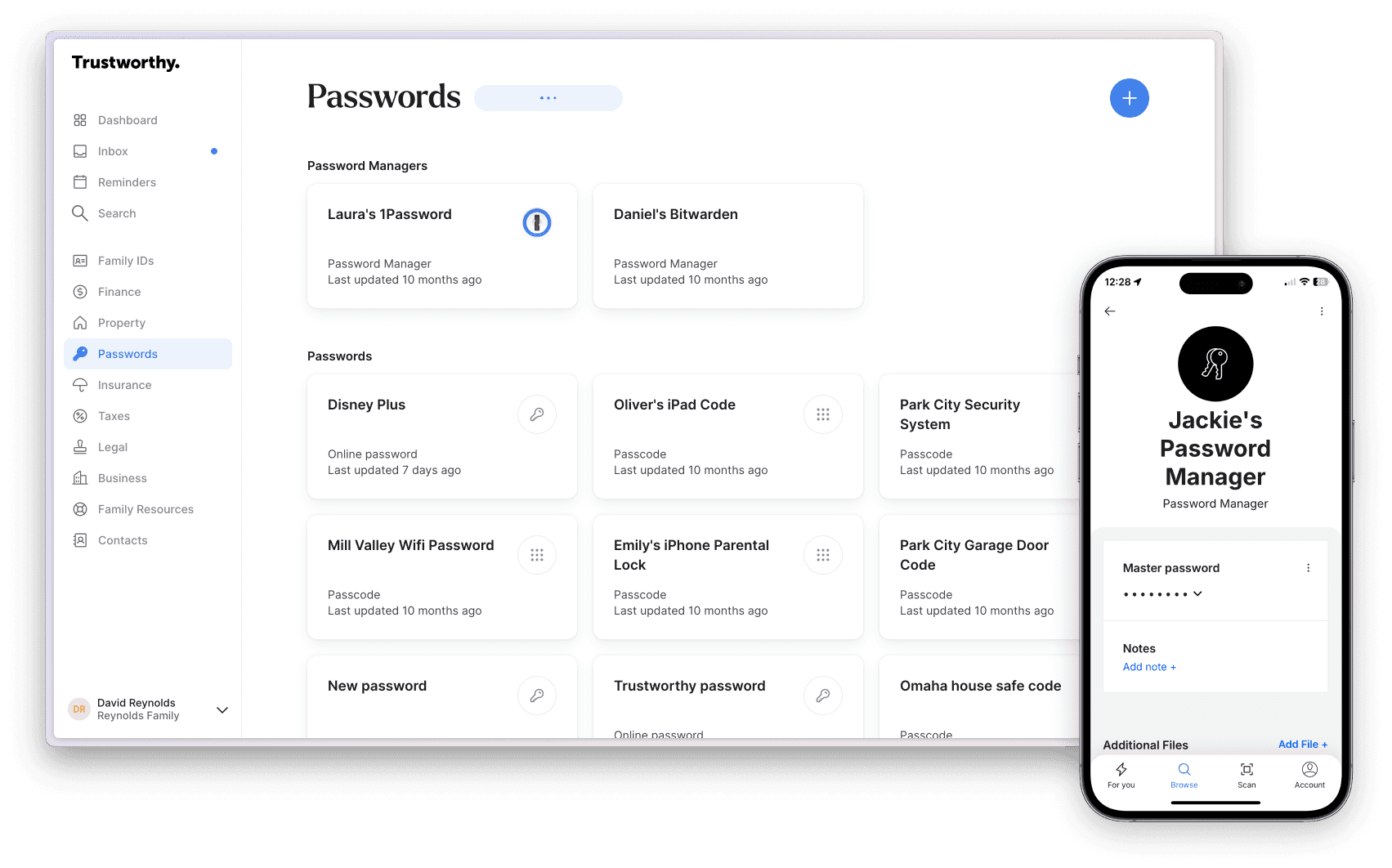Although password managers provide a convenient way to store and organize all your passwords, they are subject to hacks and breaches.
So what should you do if your password manager is hacked?
You should reset and change your master password as soon as possible. Then, enable 2-factor authentication to prevent further breaches of your password manager. Once you make a new password, you should also change the compromised passwords inside the password manager. Luckily, password managers make this process easy.
Although password manager hacking incidents are rare, there’s always an inherent risk regarding anything on the web. So, it’s crucial you understand the risks of using a password manager and how to prevent your accounts from getting hacked.
This comprehensive guide covers:
Whether password managers are safe to use.
How to tell if your password manager got hacked.
The five risks of using a password manager.
What happens if your password manager is hacked.
How to stay secure with Trustworthy.
Are Password Managers Safe to Use?
Password managers are programs that securely store and organize all your online passwords. These programs typically use a master password, which is essentially the key that unlocks the vault. In general, passwords are incredibly secure inside a password manager and one of the safest options in regard to data protection.
In addition to a master password, most competent password managers require additional biometric security measures like facial recognition or a thumbprint. They should also require 2-factor authentication by sending a code to your mobile device.
Reputable password managers also use industry-standard encryption protocols such as advanced encryption standards (AES). This technology scrambles all the data and makes it incomprehensible unless authorized individuals access it. Therefore, even if your password manager is hacked, it’s nearly impossible to decipher and steal information.
Cybercriminals and hackers prefer to take the path of least resistance. They usually target small businesses and individuals that don’t take any password security measures. For this reason, password managers aren’t typically worth a hacker’s energy and time.
In essence, everything can be hacked. Fortunately, password managers make it more difficult for hackers to access your confidential online information.
How Will I Know My Password Manager Got Hacked?
Your password manager can be hacked if your master password is cracked, exposed, or shared with an untrustworthy individual. It can also be hacked if your computer gets infected with trojans, spyware, or keyloggers. You will know if your password manager is hacked if you receive a notification about a suspicious or unverified login.
Therefore, your most important task is to create a long and unique master password. You must also protect your computer with antivirus software and avoid downloading or clicking anything suspicious.
Most well-known password managers provide breach monitoring features that instantly notify you if any of your passwords are hacked or leaked in a public data breach. As such, you will know immediately if your password manager is compromised.
Risks of Using a Password Manager

Although there are risks to using a password manager, the risks of not using one are far more significant. For this reason, I highly recommend all people use a password manager to protect their online data.
Nevertheless, let’s take a closer look at the four key risks of using a password manager. This way, you can prevent password and account breaches.
1. All Passwords Stored In One Location
The primary risk of password managers is they have a single point of failure. In theory, hackers are only one step away from accessing everything inside your private password vault. Therefore, if your master password is breached, the hacker can view and tamper with all of your stored account information.
This is essentially putting all your begs in one basket. As long as you make a long and complex master password and enable multifactor authentication, you are more secure than 99% of the online population.
2. Your Accounts Are Easier to Access
Another risk of using password managers is that people tend to stay logged into their password managers on multiple devices. Although this makes it easy to access your accounts from any device, it also makes it easier for others to access your passwords if your device is stolen.
The best way to prevent this risk is by only logging into your password manager when you want to use it. In this case, you should keep your password manager logged out on all your devices. Then, when you need to access a specific account, re-login to your password manager with the master password.
3. Password Managers Have Been Hacked Before
Unfortunately, password managers have been hacked before. OneLogin was hacked in 2017, and LastPass was breached in 2022.
In March 2023, LastPass issued a statement that the breach resulted in unauthorized users gaining unencrypted access to customers’ vault data, including information like usernames and passwords. If you are a LastPass user, we recommend finding an alternative solution to store your passwords and changing all of your passwords immediately. Check out the best family password managers (and why you should get one) for alternatives.
4. 2FA Isn't Mandatory
For some reason, not all password managers require 2-factor authentication (2FA). 2-factor authentication is a security protocol requiring users to accompany their master password with a second piece of verification, such as a biometric scan or one-time password sent to a smartphone.
This security feature is crucial to enable because it prevents hackers from breaching your password manager even if they get ahold of your master password.
5. Forgetting Your Master Password
The last risk of using a password manager is forgetting your master password. Since you likely have an incredibly long and complex master password, it can be difficult to memorize. Furthermore, your password manager won’t be very effective if you often forget your master password.
Writing your master password on a piece of paper or document on your computer also poses risks. What if your computer is stolen or hacked? What if you lose the paper containing your master password?
The best way to store your master password is with Trustworthy. Trustworthy is a secure digital storage platform designed to keep your passwords safe and unbothered. Keep reading towards the end of today’s guide to learn how Trustworthy can transform your online security measures.
What Happens If My Password Manager Is Hacked?
In most cases, getting hacked doesn’t result in all your accounts and passwords falling into the wrong hands. This is because password managers are locally encrypted. As such, if a hacker breaches your password manager, they can only see encrypted information. The hacker won’t be able to decipher your data.
Nevertheless, let’s discuss the best action plan for if someone hacks your password manager:
1. Make a Secure Master Password
Your first step is to make a new master password as soon as possible.
I recommend using 12 to 20 characters and a mix of symbols, letters, numbers, and special characters. If you want to make sure the password is memorable, you can use specific song lyrics, book quotes, or a sentimental string of words.
2. Change Passwords
The second step is to change the passwords for all the crucial accounts like online banking, email, and anything related to your money.
Then, enable 2-factor authentication on each of the critical accounts.
Once you finish modifying the essential accounts, you can change the password of less crucial accounts such as streaming and social media.
3. Enable Multifactor Authentication
Once you create new secure passwords, the next step is to enable multifactor authentication on your password manager.
I recommend using the Google Authenticator app or asking the password manager to text a one-time passcode whenever you want to log in.
Stay Secure With Trustworthy
When it comes to the modern age and the technology we have at our fingertips, there’s nothing more important to protect than our online passwords and accounts.
The best way to keep your password manager secure is by keeping your master password safe with Trustworthy.
Trustworthy is an advanced online storage hub dedicated to storing passwords, IDs, estate planning documents, and much more. Unlike Google Drive and OneDrive, Trustworthy is meant for confidential documents you don’t want anybody to get their hands on.

By using Trustworthy and your password manager in tandem, you offer the most protection possible for your password vault.
Trustworthy (try it free) provides the easiest and most secure way of storing a complex master password.
Related Articles
We’d love to hear from you! Feel free to email us with any questions, comments, or suggestions for future article topics.
Trustworthy is an online service providing legal forms and information. We are not a law firm and do not provide legal advice.











